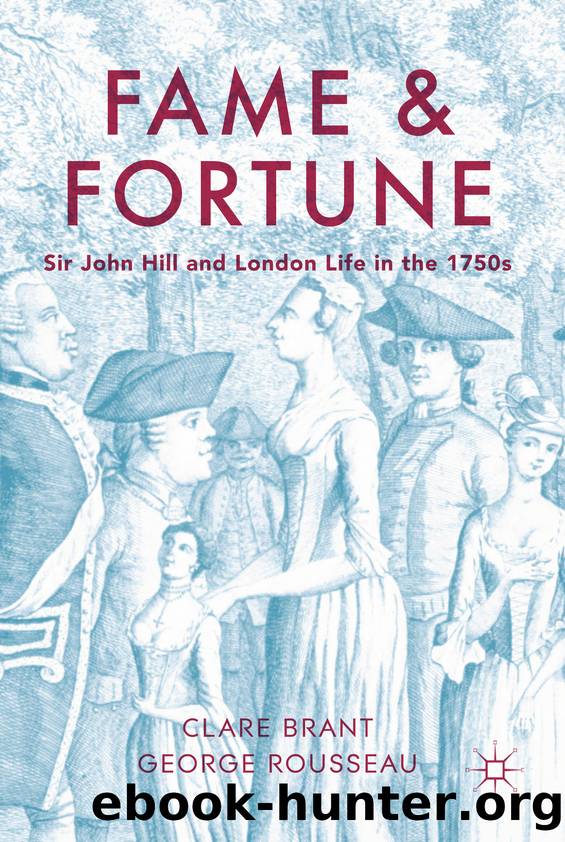Fame and Fortune by Clare Brant & George Rousseau

Author:Clare Brant & George Rousseau
Language: eng
Format: epub
Publisher: Palgrave Macmillan UK, London
Taking advantage of his position as editor of the British Magazine , Hill published his âA Dissertation on Royal Societiesâ in its March issue of 1750, as well as selling it in separate pamphlet form.
Hill was directing this particular invective at a mistake made by Rev. Henry Miles and Henry Baker whereby they had falsely identified objects Miles had found in ditch water. Believing them to be tiny living animals, they related their findings in Philosophical Transactions but, embarrassingly for them, the objects turned out to be seeds. 42 In âA Description of a Meeting of a Royal Society in London and a Coffee-House Conversationâ, the narrator relates an incident where he hears wildly exaggerated tales being told as he follows the fellows into a coffeehouse. One gentleman tells of a frightful monster âwith Wings and Claws, voided by a Lady, on taking a single Dose of his Worm-Powder; a second, of a living Wolf in one of his patientâs Breasts, and a third, of a Toad in a Block of Marbleâ. 43 These wags collected at âWits Corner in the Bedford Coffee-House, and behind the sacred Veil at Rawthmellâsâ, 44 coffeehouses being a meeting place for the discussion of Londonâs natural philosophers, including members of the Royal Society. 45 Hill, who frequented the Bedford Coffee-House , obviously abhorred the ridiculous claims to which he had been party in discussions at this establishment by Royal Society members. He was not alone in his condemnation of such declarations. The Gentlemanâs Magazine mocked the Royal Society in reports made of a mother who gave birth to a leonine monster âwith nose and eyes like a lyon, no palate to the mouth, hair on the shoulders, claws like a lyon instead of fingers, no breast-bone, something surprising out of the navel as big as an egg, and one foot longer than the otherâ. 46
In earlier sex guides, such as Nicholas Venetteâs Mysteries of Conjugal Love and Aristotleâs Masterpiece, sexual activities were closely connected with the desire to conceive, with advice on the best way to perform in order to become pregnant. Hillâs satires did the opposite. In his experimental world, sex could take place without pregnancy, and pregnancy without sex, freeing couples from both moral castigations and parental obligations. The disengagement of these two hitherto intertwined activities took place in Hillâs mind more than three centuries before it was actually possible. In this sense, Hill was a visionary, able to imagine a world in which women were biologically free from men, where men were no longer necessary for conception. In overturning contemporary views (both religious and scientific), that the male was responsible for creating the vital force in the production of babies, he had attacked the speculators and their attempts to understand female fertility. Implicit in his writing, however, is the underlying (and common) assumption that women were sexually rapacious by nature.
In reality, at this time Hill was more interested in the damage he could cause to his detractorsâand he seems to have hit his mark.
Download
This site does not store any files on its server. We only index and link to content provided by other sites. Please contact the content providers to delete copyright contents if any and email us, we'll remove relevant links or contents immediately.
Blood and Oil by Bradley Hope(1561)
Wandering in Strange Lands by Morgan Jerkins(1420)
Ambition and Desire: The Dangerous Life of Josephine Bonaparte by Kate Williams(1389)
Daniel Holmes: A Memoir From Malta's Prison: From a cage, on a rock, in a puddle... by Daniel Holmes(1334)
Twelve Caesars by Mary Beard(1315)
It Was All a Lie by Stuart Stevens;(1296)
The First Conspiracy by Brad Meltzer & Josh Mensch(1168)
What Really Happened: The Death of Hitler by Robert J. Hutchinson(1163)
London in the Twentieth Century by Jerry White(1147)
The Japanese by Christopher Harding(1133)
Time of the Magicians by Wolfram Eilenberger(1126)
Twilight of the Gods by Ian W. Toll(1119)
Cleopatra by Alberto Angela(1094)
A Woman by Sibilla Aleramo(1092)
Lenin: A Biography by Robert Service(1076)
John (Penguin Monarchs) by Nicholas Vincent(1068)
Reading for Life by Philip Davis(1024)
The Devil You Know by Charles M. Blow(1024)
The Life of William Faulkner by Carl Rollyson(984)
